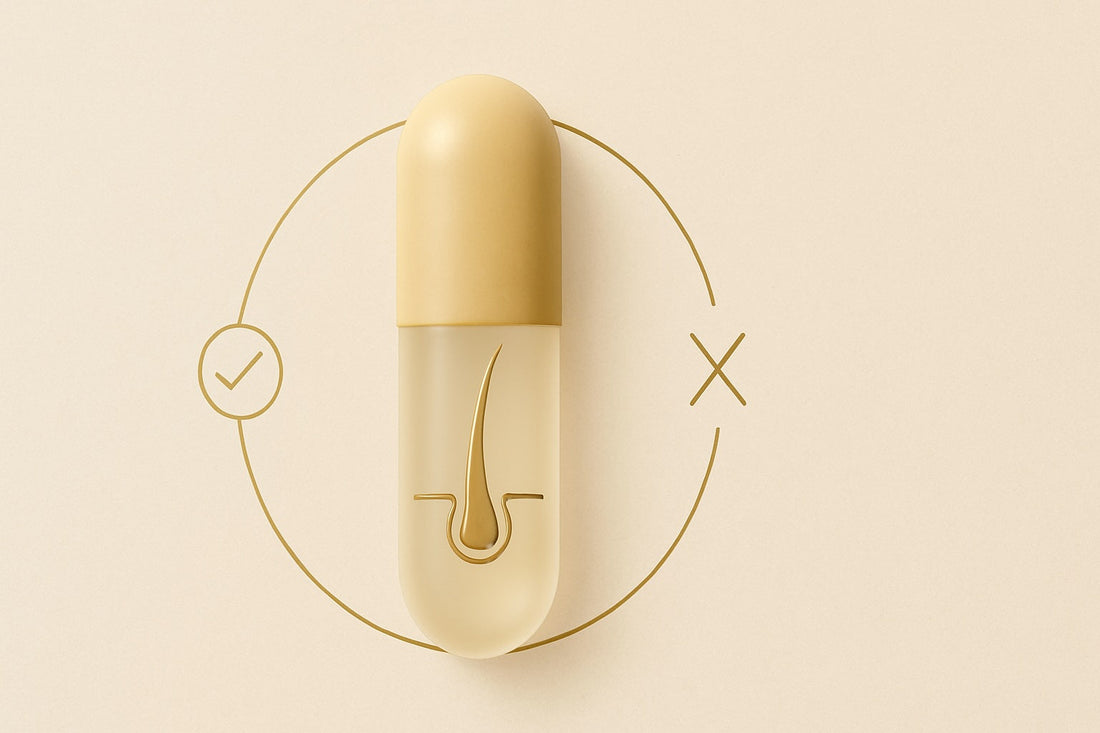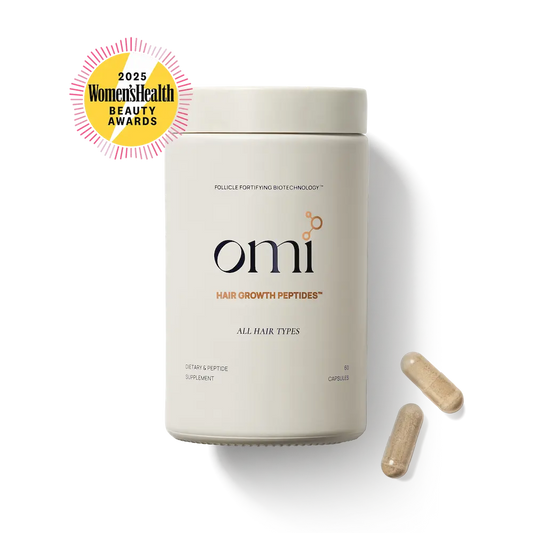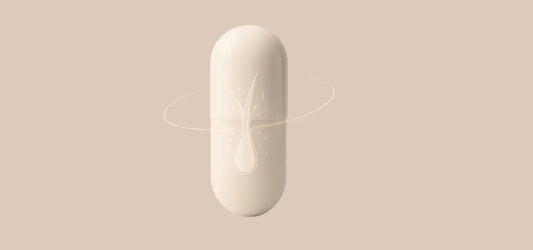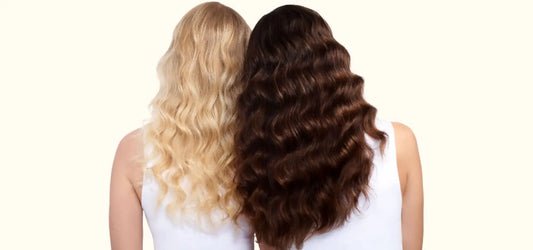What Vitamins Will (And Won’t) Help with Hair Growth

SHOP this article
OMI
Hair Growth Peptides Capsules
Promote stronger hair growth and scalp health with our unique peptide formula.
Vitamins for hair growth are a veritable alphabet soup of healthy hair promises. Add in the minerals, plant extracts, adaptogens and other popular ingredients and it can be hard to know which of these truly support hair growth—and which are just making marketing claims.
To help clear up the confusion, this article will take an evidence-based, in-depth look at the role of vitamins, minerals, and targeted supplements play in hair health and growth, from the nutrients that matter when you're deficient, ingredients with limited or no benefit, and the risks of overuse. You’ll also find research-based insight into how keratin peptides, especially OMI Hair Growth Peptides, support hair from within, even in people who don’t have nutrient deficiencies.
How Proper Nutrition Supports Healthy Hair Growth
Hair growth is a dynamic, biological process shaped by a combo of genetics, hormones, stress, health conditions, and diet. While your DNA and hormones largely determine the density and texture of your hair, nutrition can either support or weaken that genetic foundation.
Hair follicles are among the most metabolically active structures in the body. They require a constant flow of nutrients, energy, and amino acids. When that supply is interrupted, whether by illness, dietary gaps, or nutrient malabsorption, the hair growth cycle can slow or stall. This often results in excess shedding and weaker, thinner strands. But that also doesn’t mean that consuming more nutrients will necessarily lead to thicker or faster-growing hair; unless you’re deficient in a certain vitamin or mineral needed for hair growth, it’s unlikely you’ll experience any benefits.
Vitamins and Mineral Deficiencies That May Impact Hair Growth
Vitamin D
Low vitamin D levels have been strongly linked to multiple forms of hair loss, including telogen effluvium (the shedding phase of the hair growth cycle) and androgenetic alopecia. In individuals with a deficiency, supplementation has been shown to improve hair growth.
- Recommended dose if deficient: 2000 to 5000 IU per day
- Risk of excess: Because vitamin D is fat-soluble (meaning it can stay in your tissues), excessive intake can lead to toxicity and elevated calcium levels
Iron
Iron deficiency is a well-established cause of chronic hair shedding. Women are particularly susceptible due to menstruation. Low ferritin levels are often associated with diffuse (all over) hair loss.
- Target ferritin level: Above 70 ng/mL for optimal hair support
- Additional tip: Pair iron with vitamin C to improve absorption
Biotin (Vitamin B7)
Biotin is a common addition to hair supplements but unless you’re deficient, it’s unlikely to offer any benefits. In fact, biotin deficiency is uncommon and typically linked to specific health issues or long-term medication use.
- When it helps: Only in cases of confirmed deficiency
- Risk of excess: High doses can interfere with lab tests, potentially leading to misdiagnosis
Zinc
Zinc supports the repair and renewal of rapidly dividing cells, including those in the hair follicle. It may improve hair health in those with a deficiency, but the benefits of routine supplementation are not well supported.
- When to consider it: If tests reveal low zinc levels or you experience symptoms like brittle nails or poor wound healing (discuss with your medical provider)
- Caution: Both too little and too much zinc can contribute to hair loss
Folic Acid (Vitamin B9)
Folic acid is necessary for healthy cell division and DNA replication. These processes are essential for the normal functioning of hair follicles. However, the link between folate supplementation and hair growth remains unclear in people with adequate levels.
- Best used: When a deficiency is diagnosed
- General recommendation: Important during pregnancy but otherwise not shown to improve hair in healthy individuals
How Keratin Peptides (OMI Hair Growth Peptides) Work
Keratin is the primary protein that makes up the structure of each hair strand. Most traditional hair supplements focus on supplying the building blocks needed to make keratin, such as amino acids. Keratin peptides, on the other hand, go a step further by delivering those proteins in a form that your body can absorb and use more efficiently.
OMI Hair Growth Peptides feature a patented version of these peptides, which have been clinically tested and shown to be highly bioavailable. Once in the bloodstream, these peptides travel to the hair follicle and stimulate the production of native keratin. They also help repair damage and reinforce the strength of growing hair.
This targeted approach is particularly valuable for those experiencing weak or thinning hair in the absence of any nutritional deficiency. Many people lose volume not because they have fewer hairs, but because the strands themselves become thinner over time. Keratin peptides support the internal structure of the strand, improving both resilience and thickness.
What the Research Says
In a clinical trial that was double-blind and placebo-controlled, women experiencing hair thinning took keratin peptides daily for 90 days. The results were significant:
- Hair strength improved by 47%
- Hair shaft diameter increased by 5.9%
- Hair density increased by 9.2%
- Telogen-phase hairs, which are more likely to fall out, decreased by 47%
Even more notably, these results occurred without correcting for any known vitamin or mineral deficiency, and that keratin peptides appear to offer important structural support to hair regardless of nutrition.
The takeaway: Unlike standard supplements that primarily offer general nutritional support, OMI Hair Growth Peptides work on the physical composition of the hair from within by delivering usable keratin peptides directly to the follicle.
Do Hair Growth Supplements Actually Work?
That depends. If a person is deficient in a key nutrient, such as vitamin D, iron, or biotin, then correcting that deficiency can support hair regrowth and, in these cases, a supplement can make a meaningful difference. But if you’re not deficient in any of the above, taking additional amounts won’t necessarily result in more hair. In fact, over-supplementation can cause side effects, and in some cases even lead to more hair loss.
Structural supplements, such as keratin peptides, are a different story entirely. Instead of fixing a nutritional deficiency, they help strengthen and thicken existing hair by enhancing the quality of the keratin within each strand. This means they may be helpful even when bloodwork shows no nutritional deficiencies.
If you’re already eating well and taking care of your overall heath, peptides, like those in OMI Hair Growth Peptides, can help fill the gap between general wellness and targeted cosmetic improvement.
It’s also important to remember that not all hair loss can be reversed with supplements. Genetic conditions, hormonal imbalances, autoimmune disease, and stress are major contributors. In these cases, supplements might support overall hair health but are no replacement for medical treatments like minoxidil, laser therapy, or prescription medications.
For best results, think of supplements as one part of a multi-faceted approach. They may improve the internal environment, support growth, and protect against environmental damage, but they work best when paired with other evidence-based treatments and a healthy lifestyle.
How to Know If You’re Deficient
If you’re experiencing hair loss, don’t assume you need a supplement right away. Start by speaking with your healthcare provider and requesting basic bloodwork. The following labs can help guide treatment:
- Ferritin (to assess iron stores)
- 25-OH Vitamin D
- Serum zinc
- Vitamin B12 and folate
- CBC (complete blood count)
- Thyroid panel (TSH, T3, T4)
Once you have this info, your doctor can determine if you have a deficiency and whether taking supplements makes sense.
The Role of Genetics and Hormones
Some of the most common causes of hair loss are not nutritional at all. Androgenetic alopecia, or hereditary hair thinning, is driven by a sensitivity to dihydrotestosterone (DHT) and often begins gradually. Hormonal changes during pregnancy, postpartum, or menopause can also trigger sudden or diffuse shedding.
In these cases, diet and supplements may support general hair quality, but targeted therapies are usually necessary. These may include topical medications, oral hormone regulators, or treatments like microneedling and laser devices. A personalized plan that considers both internal and external contributors tends to be the most effective.
Final Thoughts: A Personalized Approach
The decision to take a hair growth supplement should be informed by testing and tailored to your unique needs. If your hair thinning stems from a nutritional deficiency, correcting that imbalance can make a significant difference. However, without testing, taking supplements blindly is unlikely to help and may even create new problems.
Focus first on a diet rich in hair-supportive nutrients, including leafy greens, citrus fruits, lean proteins, nuts, seeds, legumes, and healthy fats. If testing confirms that you're getting everything you need nutritionally but your hair still feels thin or weak, consider adding a structural supplement like OMI Hair Growth Peptides. These peptides can help rebuild strength and resilience in the hair shaft even when your vitamin and mineral levels are adequate.
Remember that hair loss often involves multiple causes. Stress, hormones, genetics, illness, and aging all influence hair health. The most effective solution is rarely a single pill but rather a holistic strategy that combines science-backed nutrition, smart supplementation, medical guidance, and patience.
Summary: What Helps, What Doesn’t
The nutrients most likely to support hair growth are those you’re genuinely lacking. Research supports the use of vitamin D, iron, and biotin in people with deficiencies. Zinc and folic acid may also help in select cases, though evidence is less consistent. By contrast, nutrients such as vitamin B12, vitamin C, and vitamin E appear to offer little to no benefit unless a deficiency is clearly present.
Avoid supplementing with vitamin A or selenium unless instructed by a doctor, as too much of either can actually cause hair loss.
Unlike most vitamins and minerals, keratin peptides work by enhancing the physical properties of the hair itself. These structural supplements have been shown to increase hair strength, thickness, and density, even in individuals without any nutrient deficiency. OMI Hair Growth Peptides have demonstrated strong clinical results and offer a powerful tool for anyone looking to improve hair quality from the inside out.
The best approach to hair health is grounded in self-awareness, testing, and a willingness to personalize your plan. Supplements can be effective, but only when used for the right reasons and with the right expectations.
Frequently Asked Questions
1. Do hair vitamins work for everyone?
Hair vitamins are effective only if you have a diagnosed deficiency in nutrients like vitamin D, iron, or biotin.
2. What are keratin peptides, and how do they help hair?
Keratin peptides are bioactive protein fragments that strengthen and thicken hair by improving its structure from within.
3. Can taking too many vitamins cause hair loss?
Yes, over-supplementing with fat-soluble vitamins like A and E or minerals like selenium can contribute to hair thinning.
4. How long does it take to see results from hair supplements?
Most hair supplements, including keratin peptides, show visible results within 8 to 12 weeks of consistent use.
5. Should I take a hair supplement without testing first?
No, it's best to get bloodwork done first to identify any deficiencies before starting a supplement regimen.

 8 minutes
8 minutes







